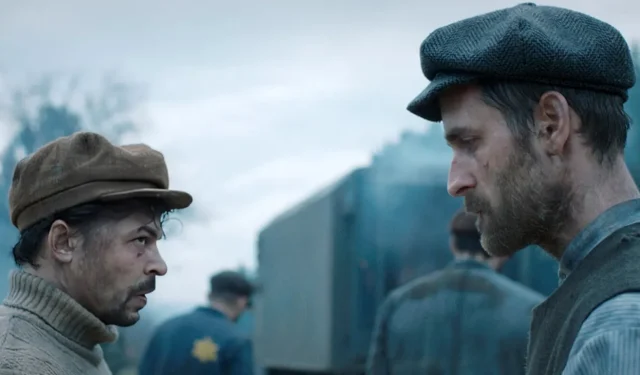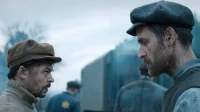Exploring the Depths of the Holocaust: “The World Will Tremble”
Films addressing the Holocaust undoubtedly face a higher standard than most cinematic topics. Given the gravity of such historical events, any production that fails to deliver a poignant portrayal risks being perceived as exploitative. While Lior Geller’s independent feature, The World Will Tremble, may not fully meet this elevated benchmark, it compensates through evident dedication, strong performances, and compelling cinematography. Notably, it brings to light a lesser-known narrative that is deserving of recognition, thereby solidifying its spot within this crowded genre.
The Story Unfolds: A Journey to Chelmno
Set in 1942 Poland, the film introduces viewers to the Chelmno extermination camp, the first specifically designed for the mass murder of Jews. The narrative centers on several individuals, including Solomon Wiener (played by Oliver Jackson-Cohen), Michael Podchlebnik (Jeremy Neumark Jones), and Wolf (Charlie MacGechan).
Upon arrival, the camp’s seemingly congenial commandant, Lange (David Kross), reassures the newcomers that conditions will improve compared to their previous experiences in the ghettos. However, this comforting facade quickly unravels as the prisoners are subjected to horrific fates, herded into vans where they face lethal gassing. The stronger men are left alive to serve as gravediggers, intensifying the grim atmosphere. A particularly harrowing moment occurs when Michael discovers his wife and daughter are among the victims, pleading for his own death, only to be denied as he is still considered fit for labor.
Shocking Displays of Sadism
The film vividly depicts the Nazis’ cruelty, illustrated when Lange commands a prisoner to play the violin, ordering him to select “something happy”to entertain their captors. The prisoners are coerced into dancing, while guards fire at their feet to amplify their torment. The gravity of the situation escalates when a guard’s misfire tragically kills a young woman Lange had been watching.
Additional brutality is showcased through target practice sessions where guards shoot at bottles placed on prisoners’ heads, resulting in yet another tragic accident. Motivated by the worsening circumstances, Solomon and Michael make a daring escape, leading to a series of intense incidents as they traverse a countryside riddled with German patrols.
Mixed Execution and Impactful Performances
Geller’s screenplay holds a somewhat mechanical approach towards its plot pacing and character development, contributing to a repetitive and disengaging experience. Additionally, the dialogue falls flat; when the protagonists finally return to their village to recount their harrowing ordeal, a disbelieving rabbi (Anton Lesser)—whose skepticism feels almost tragically ironic—remarkably states, “This is the 20th century. No one can annihilate an entire nation and get away with it.”
Nevertheless, this scene thrives due to the impassioned performances of the leading actors. When the rabbi offers the escapees food, they instinctively grasp it but pause to invoke a prayer before consuming it in desperation.
A Powerful Conclusion
Ironically, The World Will Tremble culminates most effectively in its closing moments, where onscreen text reveals that the two men provided the first eyewitness account of the mass murder of Jews, which was broadcasted by the BBC in June 1942 and became the foundation for the first news report on the Holocaust. The film concludes with footage of the elderly Podchlebnik decades later, recounting the traumatic experience of discovering his family’s lifeless bodies. His poignant, tearful expression encapsulates a deeper emotional impact than much of the preceding dramatization combined.


